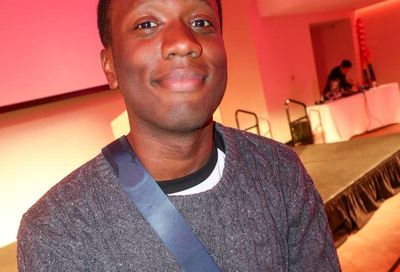Hit List
Commentary: Stonewall Baby
Arriving at the recent town-hall meeting regarding same-sex, intimate-partner violence called by the new Rainbow Response coalition, I was a little worn. I’d already spent business hours pulling my seventh day of jury duty, and now it was time for a couple more hours covering an event, to be followed by another hour writing about it to make my deadline. My thoughts were aimed outward, observing, taking notes. I’d forgotten about my own stake in the subject.
What reminded me was one of the skits performed that evening by the Black Lesbian Support Group. I wasn’t reminded immediately, but a few days later. Recollecting the skit in which a performer portrays an abuser who is unwilling to take a presumably mood-stabilizing medication, it hit me that I was actually part of the social problem Rainbow Response and the BLSG was tackling. That this wasn’t apparent before I’d even set foot in the Equality Forum that evening may be a commonplace response: gay men downplaying abuse they suffer at the hands of other gay men out of shame or embarrassment. For me, over the long haul, I’d say that fits.
While partner abuse can be as extreme as murder, let me first emphasize that I’m well aware that the abuse I suffered was awfully minor by comparison. So minor, in fact, that it’s usually easier for me to forget it ever happened, which also seems to be part of the problem. So it follows that I should be as open about it as possible, doing what I can to further the dialogue.
Here goes: There are two relationships I’ve had that I would definitely say included elements of abuse.
The first lasted about nine months, when I was about 23. Primarily, this boyfriend I lived with was domineering and persistently finding ways to encroach on my sense of self. First, it was simple things like making me feel guilty about, well, just about everything. A silly example was bringing home a pint of Ben and Jerry’s after a night class and hearing, ”Why didn’t you bring me anything?” in a very serious tone. So the next time I was in a similar situation, I made sure not to forget him. ”That has nuts. I hate nuts. But I’ll eat it.”
That was the subtle beginning. It lead to more, like the afternoon he totaled my car by driving through a red light: ”It was your fault, because I was crying.” A few days later, I was sitting in our living room, perhaps watching TV or reading. He was walking across the room with a rolled up magazine in his hand, which he swatted across my head, and kept walking. I don’t recall what I’d done to deserve that, but I’m sure there was something. I do, however, recall my reaction. I simply sat there, dumbfounded, as he continued out of the room. I concentrated not on the pain, which, admittedly, was not so severe, but on the humiliation. I couldn’t fathom how the course of a few months had led me to this place where my domestic situation allowed for this sort of behavior. I ended up fleeing that relationship with the help of a friend who drove up while my partner was at work. We gathered whatever of my belongings would fit into her car and scrammed. I had become too scared of him to tell him I was leaving.
Sadly, it was my very next relationship that is the source of my second recollection. This time, I was involved with a guy exhibiting symptoms of depression, social anxiety disorder, and a few other maladies that only a professional might classify. And I was completely in love. We were together for about five years. Never mind that in the first year, he was angry to the point of crazed because upon graduation night in college someone suggested a spur-of-the-moment road trip to Atlantic City. After that silly odyssey, the most scandalous component of which involved about two hours of wandering a casino around 6 a.m., I had to call him to let him know what I had done. He was incensed that I’d made the trip since we had some weeks earlier discussed the possibility of making a trip there ourselves. He drove the four-or-so hours from his home in Pennsylvania down to Richmond just to show me how angry he was.
In my kitchen, as he stewed with clenched fists, I asked, in desperation, ”Would you feel better if you hit me?” He didn’t hesitate. ”Yes.” So I let him punch me in the gut. He didn’t pull that punch, either. He nearly knocked the wind out of me. Then he asked if he could do it again, because it felt good.
At least I still had enough dignity, which wasn’t much, to tell him that once was enough. Suffering the punch appeased him enough that we eventually moved cross country together. Lucky me. But sarcastic or not, I was with him for five years, rationalizing that he wasn’t responsible for his actions because he needed therapy and medication. Beyond that, in my young psyche, I thought there was something noble about accommodating his moods and violence. There wasn’t.
Many of us are familiar with intimate-partner violence — probably more of us than we as a community would like to acknowledge. But if we’re going to do anything about making it unacceptable, acknowledgement is the first step.
Will O’Bryan, Metro Weekly managing editor, was born as the Stonewall Riots ended, making him a Stonewall Baby, he insists.
Support Metro Weekly’s Journalism
These are challenging times for news organizations. And yet it’s crucial we stay active and provide vital resources and information to both our local readers and the world. So won’t you please take a moment and consider supporting Metro Weekly with a membership? For as little as $5 a month, you can help ensure Metro Weekly magazine and MetroWeekly.com remain free, viable resources as we provide the best, most diverse, culturally-resonant LGBTQ coverage in both the D.C. region and around the world. Memberships come with exclusive perks and discounts, your own personal digital delivery of each week’s magazine (and an archive), access to our Member's Lounge when it launches this fall, and exclusive members-only items like Metro Weekly Membership Mugs and Tote Bags! Check out all our membership levels here and please join us today!


















